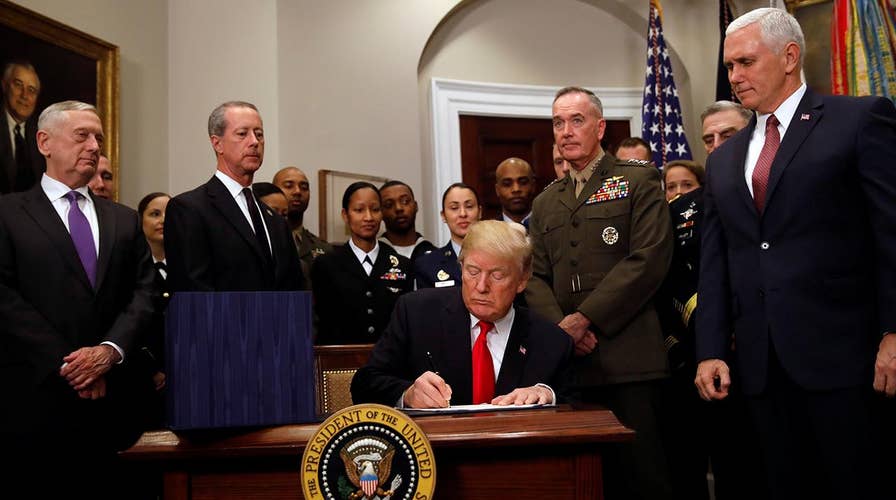President Trump signs National Defense Authorization Act
President says spending hike is a step forward to restoring America's military might.
On Inauguration Day 2017, the Obama administration left President Trump a severely weakened and constrained military. For the better part of a decade, President Obama allowed his administration’s sequestration to destroy the capabilities and readiness of our armed forces. He forced our Americans in uniform to take the risk that a weaker military would not further endanger their lives and our own national security.
In 2017, we witnessed North Korea’s aggressive nuclear action, Russian meddling in democratic systems (including our own), and an Iranian regime dedicated to expanding its sphere of influence at the expense of their neighbors’ peace and freedoms. On top of all that, our men and women in uniform fight against violent radicalism around the world.
Given the scope of these challenges our military faces, remarkably, Secretary of Defense James Mattis testified, “No enemy in the field has done more to harm the combat readiness of our military than sequestration.” Chairman of the Joints Chiefs of Staff, General Dunford, added, “Eight years of continuing resolutions and the absence of predictable funding has forced the [Defense] Department to prioritize near-term readiness at the expense of modernization and advance capability development.”
In the final four years of the Obama presidency, our military’s ability to deploy around the world and win wars deteriorated. To right this wrong, in May, an overwhelming 140 of my Republican colleagues—the majority of the majority—joined me in asking Speaker Paul Ryan to bring a vote to repeal the sequestration of national defense to the floor. Congress can and must undo the devastation of the Obama era to our defense.
The president also called for this while signing the National Defense Authorization Act for Fiscal Year 2018 (FY18 NDAA) and again in his speech on the National Security Strategy. The first step in ensuring national security is funding our armed forces at the full $700 billion FY18 NDAA requirement.
Our Armed Forces are charged with securing not only our nation but our ideals of freedom and democracy around the world. Sadly, that force eroded during the Obama administration to one that has too many troops that cannot deploy, too many planes that cannot fly, and too many ships that cannot sail.
Our Armed Forces are charged with securing not only our nation but our ideals of freedom and democracy around the world. Sadly, that force eroded during the Obama administration to one that has too many troops that cannot deploy, too many planes that cannot fly, and too many ships that cannot sail.
During the last administration, our Army let nearly 90,000 soldiers go and fewer than 10 percent of our brigade combat teams are now ready to deploy.
We have 41 fewer ships than in 2001, over half of the Navy’s aircraft are grounded, and the tragedies of the USS Fitzgerald and USS McCain show our sailors are pushed to the breaking point.
A full 80 percent of our Marine Corps aviation units lack the minimum number of ready aircraft.
The Air Force needs 2,000 more pilots to fly aircraft that are on average 27 years old.
The FY18 NDAA is a bipartisan effort of the House and Senate Armed Forces Committees to address these serious issues and provide our military the means necessary to regain their readiness. It is a good faith attempt from the Senators and Representatives, Republicans and Democrats, who know the national security landscape best, to regain the preeminence of our military.
Some of my colleagues in Congress are struggling to recognize the risk of continuing to weaken our armed services. We ask our service men and women to do more with less. Each time we defer our responsibility to fund our defense, we fail those willing to protect this nation with their lives.
Expecting our military to successfully operate on this system of fictional and unreliable budgeting is incredibly irresponsible, unrealistic, and gambles with our safety. We cannot continue to neglect our soldiers, sailors, marines, and airmen and expect them to be ready to answer the nation’s future calls. We need a fiscal deal to replace the devastating Budget Control Act and end the effects of sequestration.

